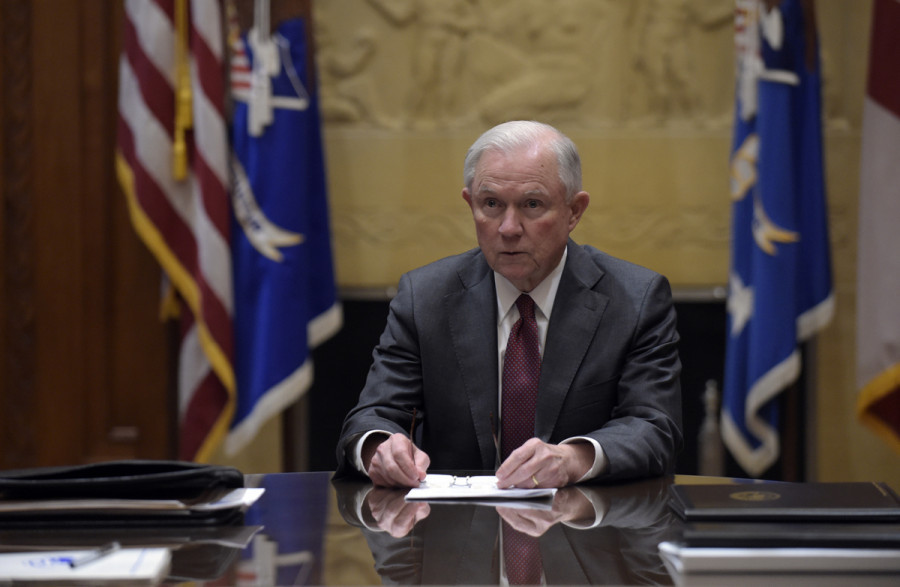Jeff Sessions Moves to Rescind Obama-Era Federal Marijuana Policy
He's freeing up U.S. attorneys to crack down on states like Massachusetts.

Photo via AP
Jeff Sessions’ Department of Justice is rolling back the clock on marijuana policy today, sparking concern and sowing confusion in states around the country, including Massachusetts, that have voted to legalize the drug.
Sessions on Thursday announced the DOJ is rescinding Obama-era guidance (particularly the Cole Memorandum, named after the then-deputy AG who wrote it) that has set the tone for how the federal government has handled marijuana for five years.
Marijuana is still illegal federally. But since 2013, the official guidance to federal prosecutors had been to stay out of the way in states like ours that have voted to legalize it for medical or recreational use, so long as the drug is kept away from children and gangs and is prevented from traveling across state lines. Medical pot has been legal in Massachusetts since 2012, and 54 percent of voters elected to legalize recreational pot in 2016. The first pot shops are slated to open here in July.
Sessions called his decision a return to “the rule of law” and characterized the policy of the Obama administration as inhibiting law enforcement in a news release. “[T]oday’s memo on federal marijuana enforcement simply directs all U.S. Attorneys to use previously established prosecutorial principles that provide them all the necessary tools to disrupt criminal organizations, tackle the growing drug crisis, and thwart violent crime across our country,” the statement reads.
The move will shift decision-making about enforcement to states’ U.S. attorneys. The U.S. Attorney for Massachusetts is Andrew E. Lelling, of Sharon, who was nominated by President Trump in September and sworn in December 21. Lelling in a statement said his office would “continue to use our prosecutorial discretion” when it comes to federal marijuana enforcement. He also said he believes “marijuana is in fact a dangerous drug” and said his office would “continue to prosecute bulk cultivation and trafficking cases, and those who use the federal banking system illegally.”
Marijuana dispensary owners complain that limits on access to the banking system can force them to carry dangerous amounts of cash. While most are too skittish, there are local banks who will do business with dispensaries, but there are hurdles and it can be expensive. The state has provided guidance, based on the Cole memo, to banks that wish to provide financial services to marijuana businesses. How banks, not to mention business owners and investors, will respond to the loss of security the Cole memo provided remains to be seen.
Gov. Charlie Baker, who does not support marijuana legalization, nevertheless said he did not support the move. “The Baker-Polito Administration fully supports the will of the voters and the [Cannabis Control Commission’s] mission,” his office said in a statement. “The administration believes this is the wrong decision and will review any potential impacts from any policy changes by the local U.S. Attorney’s Office.”
Borghesani, the former spokesman for the successful effort to legalize marijuana in Massachusetts by ballot question, also condemned the decision. “It is distressing to see Jeff Sessions making such a regressive move at a time when more and more states—and countries such as Canada—are replacing failed cannabis prohibition policies with smart, regulated approaches,” Borghesani says in a statement. “However, the true test will be how individual U.S. attorneys move forward in a post-Cole Memorandum environment. My hope is that they recognize and respect decisions by voters in legal states.”
Lelling’s statement is not exactly the one hoped for by marijuana advocates, who had called on the state’s top federal prosecutor to follow the lead of Colorado U.S. Attorney Bob Troyer. Troyer, a holdover from the Obama years, announced Thursday his office would not change its approach to marijuana whatsoever. But Borghesani says he isn’t discouraged and remains cautiously optimistic.
The Cannabis Control Commission, which is charged with overseeing the new legal marijuana industry, said in a statement that “nothing has changed,” and that the panel “will continue to move forward with our process to establish and implement sensible regulations for this emerging industry in Massachusetts.”
This was by no means a surprise. This is, after all, Jeff Sessions, a staunch opponent of marijuana who has pushed for harsher sentences for drug offenders and believes marijuana is “only slightly less awful” than heroin. So needless to say, the state’s many medical marijuana users and advocates, not to mention the slew of local pot business owners preparing for the launch of a more than $1 billion industry, have been watching him closely.
Trump’s own views on marijuana are murky. While he has said little about the issue, he told an interviewer as a candidate that he thought the matter should be left up to the states. In a departure from that stance, his press secretary Huckabee Sanders on Thursday said Trump “believes in enforcing federal law. That would be his top priority. And that is regardless of what the topic is. Whether it’s marijuana or whether it’s immigration, the president strongly believes that we should enforce federal law.”
Press Sec. Sanders, today: “The president believes in enforcing federal law,” regardless of the topic, including marijuana.
President Trump on marijuana, July 29, 2016: “I think it should be up to the states, absolutely.” pic.twitter.com/9lTwzDjK6m
— NBC News (@NBCNews) January 4, 2018
Polling shows the overwhelming majority of Americans, 64 percent, support marijuana legalization–including, for the first time ever, a majority of Republicans.


